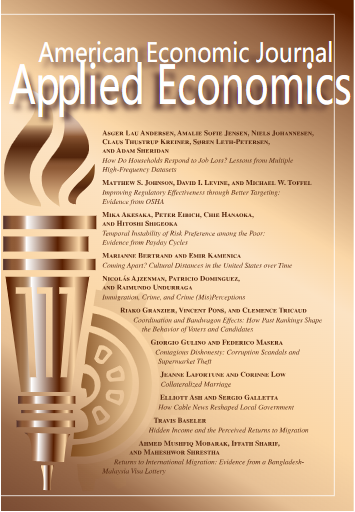政客们什么时候具有广泛的吸引力?巴西选举规则的经济后果
IF 6.2
1区 经济学
Q1 ECONOMICS
引用次数: 0
摘要
选举规则决定了选民的偏好如何被汇总并转化为政治代表。使用回归不连续设计,我对比了巴西的单轮和两轮选举。在两轮选举中,最终获胜者必须获得至少50%的选票。我指出,两轮选举为候选人获得更广泛的支持基础和更广泛地提供公共产品提供了激励。候选人代表的选民群体在地理上更加多样化,公立学校拥有更多的资源,学校之间的资源差异也更小。影响似乎是由候选人的战略反应而不是不同的进入种族驱动的。(jel d72, h41, h75, i21, i28, o15, o17)本文章由计算机程序翻译,如有差异,请以英文原文为准。
When Do Politicians Appeal Broadly? The Economic Consequences of Electoral Rules in Brazil
Electoral rules determine how voters’ preferences are aggregated and translated into political representation. Using a regression discontinuity design, I contrast single- and two-round elections in Brazil. In two-round elections, the eventual winner must obtain at least 50 percent of the vote. I show that two-round elections provide incentives for candidates to secure a broader base of support and provide public goods more broadly. Candidates represent a more geographically diverse group of voters, public schools have more resources, and there is less variation in resources across schools. Effects appear to be driven by strategic responses of candidates rather than differential entry into races. (JEL D72, H41, H75, I21, I28, O15, O17)
求助全文
通过发布文献求助,成功后即可免费获取论文全文。
去求助
来源期刊

American Economic Journal-Applied Economics
ECONOMICS-
CiteScore
9.10
自引率
1.60%
发文量
63
期刊介绍:
American Economic Journal: Applied Economics publishes papers covering a range of topics in applied economics, with a focus on empirical microeconomic issues. In particular, we welcome papers on labor economics, development microeconomics, health, education, demography, empirical corporate finance, empirical studies of trade, and empirical behavioral economics.
 求助内容:
求助内容: 应助结果提醒方式:
应助结果提醒方式:


